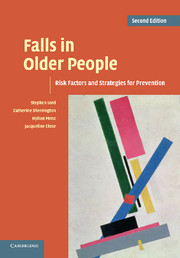Book contents
- Frontmatter
- Contents
- Preface
- Acknowledgements
- Part I Epidemiology and risk factors for falls
- 1 Epidemiology of falls and fall-related injuries
- 2 Postural stability and falls
- 3 Gait characteristics and falls
- 4 Sensory and neuromuscular risk factors for falls
- 5 Psychological factors and falls
- 6 Medical risk factors for falls
- 7 Medications as risk factors for falls
- 8 Environmental risk factors for falls
- 9 The relative importance of falls risk factors: an evidence-based summary
- Part II Strategies for prevention
- Part III Research issues in falls prevention
- Index
- References
7 - Medications as risk factors for falls
Published online by Cambridge University Press: 03 May 2010
- Frontmatter
- Contents
- Preface
- Acknowledgements
- Part I Epidemiology and risk factors for falls
- 1 Epidemiology of falls and fall-related injuries
- 2 Postural stability and falls
- 3 Gait characteristics and falls
- 4 Sensory and neuromuscular risk factors for falls
- 5 Psychological factors and falls
- 6 Medical risk factors for falls
- 7 Medications as risk factors for falls
- 8 Environmental risk factors for falls
- 9 The relative importance of falls risk factors: an evidence-based summary
- Part II Strategies for prevention
- Part III Research issues in falls prevention
- Index
- References
Summary
Medications have long been implicated as an iatrogenic cause of falls and fractures, with a number of epidemiological and prospective cohort studies providing support for a link between medications and falls. This chapter will discuss the pharmacology of ageing and the potential physiological mechanisms by which medications may impact on postural stability. Specific drug classes will be highlighted where there is evidence to support a causal link between drug use and falls, and the concept of optimization of prescribing will be explored.
Drugs and ageing
Ageing is not a clearly defined single entity but more the result of a combination of anatomical, biochemical and physiological changes that occur with time. There are alterations to the physiological reserve capacity of the human body that can lead to marked haemodynamic and biochemical compromise even with the mildest of external stressor, e.g. a urinary tract infection.
The ageing process can be associated with an alteration of the body's ability to absorb, metabolize, distribute and excrete drugs (pharmacokinetics) as well as an alteration of the drug effect at its intended target site (pharmacodynamics). Changes with age are seen in body composition, with a reduction in total body water and lean body mass and a relative increase in body fat, which impact on the pharmacokinetics of a given drug. Advancing age can also be associated with an increase in the number of disease processes, which can impact on the body's ability to deal with and respond to drugs.
- Type
- Chapter
- Information
- Falls in Older PeopleRisk Factors and Strategies for Prevention, pp. 133 - 150Publisher: Cambridge University PressPrint publication year: 2007
References
- 1
- Cited by



